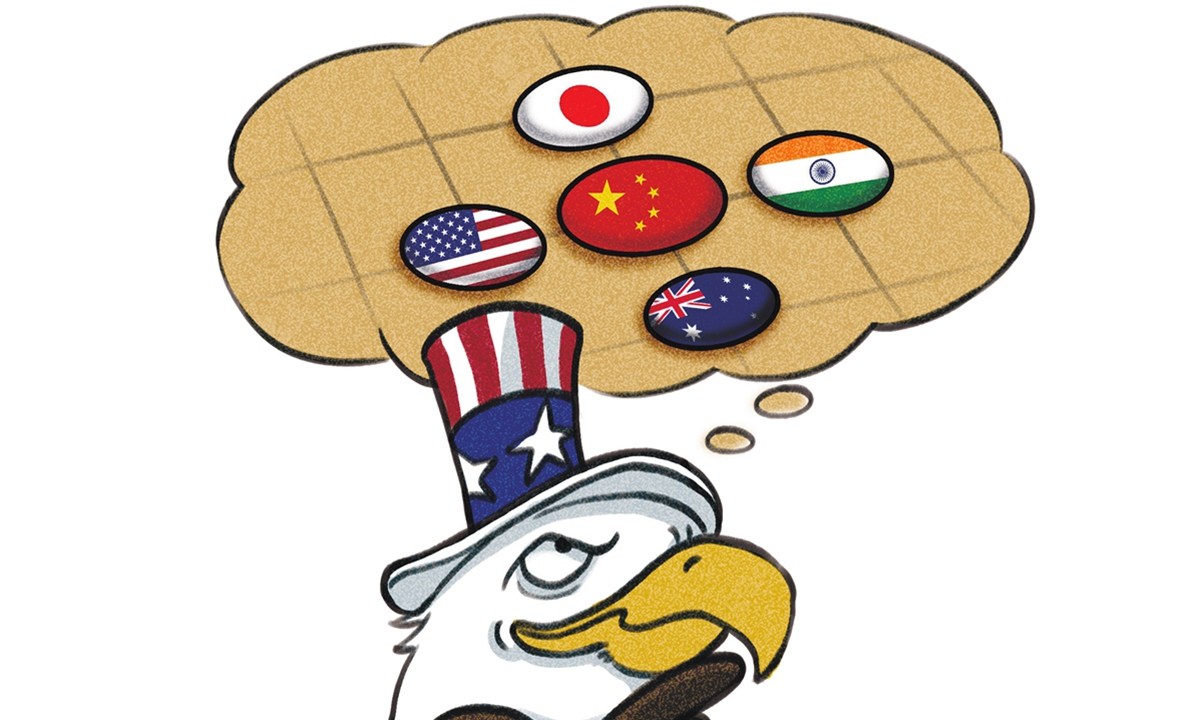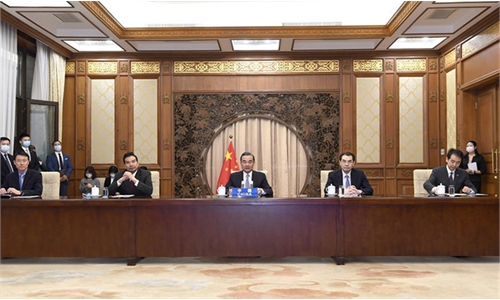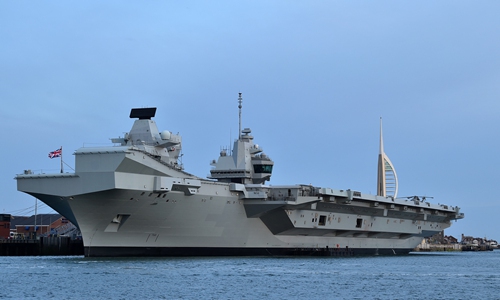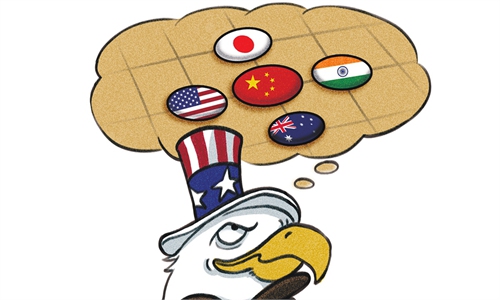
Illustration: Liu Rui/GT
Kurt Campbell, the US coordinator for Indo-Pacific affairs on the National Security Council, said on Tuesday that other countries had shown interest in the Quad, and the door of this quadrilateral mechanism is open to them, according to Bloomberg.The term "Indo-Pacific" has become a new geopolitical buzzword in recent years, with many organizations and countries showing interest in Indo-Pacific affairs. For instance, ASEAN has its outlook on the Indo-Pacific. India, as well as some European countries, including France and Germany, have their Indo-Pacific strategies respectively.
However, they are probably less interested in the idea of forming an alliance to contain China even though they are interested in participating in regional affairs. These organizations and countries are still instinctively wary of the US-led Quad because it is clear that it is a military-political alliance dominated by a Cold War mentality that specifically aims to contain China.
As an alliance in terms of military, politics and security, the Quad has already caused aversion and concerns among some of US allies in the Indo-Pacific. Thus, Washington is now shifting the focus of the Quad's cooperation to areas such as economic, social and medical sectors.
For example, the use of COVID-19 vaccines is one of its latest means to achieve expansion. The Quad is currently focusing on the production of COVID-19 vaccines. It has even promised to give vaccines to Southeast Asian countries. In fact, the Quad is using the vaccine to pull in countries in the region, such as ASEAN members.
Apart from vaccines, there may be only one way for the US to expand the Quad in the future: To stand from a position of strength and to force its allies to join. So there is the very real possibility that some US allies may be forced to join the Quad. But they will not be willing to take sides between China and the US. Nor will they fully cooperate with Washington to contain Beijing. This is because cooperating with the US means helping it to achieve its geostrategic self-interests at the cost of their own ties with China. This is not what these countries want to see.
As for the Indo-Pacific region, a mechanism like the Quad brings more challenges than opportunities to it. Many countries in the region are concerned that the Quad may provoke regional strife and confrontation. On this basis, it may impact or even destroy the regional security architecture with the East Asia Summit at its core, or ASEAN at its center.
Moreover, the Quad has excluded China, a vital player in the Indo-Pacific. Without China's coordination and support, it will be difficult for some regional mechanisms and arrangements to be carried out. In this regard, ASEAN members are more pragmatic. The Quad is following the path of Cold War, with dim prospects.
An article run by the Times of India on Tuesday argues, "The Quad will inevitably lead to other Quad-like groupings - India-France-Australia; India-Indonesia-Australia; slightly larger Quad-Plus groupings… all of them reinforce the fact that in contemporary geopolitics, pluryilateral/minilaterals may be more flexible and resilient."
Such a view serves to whitewash or pave the way for the Quad. A true multilateralism is inclusive and open, and aims to promote solidarity and focuses on development and cooperation. Those in which the US gangs up with its allies and partners, such as the Quad, are not multilateralism. The manner of forming small cliques is also undesirable. Those politicians or countries have failed to learn the value and content of true multilateral successes.
US officials like to brag about how many allies Washington has, but they forget one thing: The relationship between the master and his servants is not an alliance.
Some "minilateral" mechanisms do exist in the Asia-Pacific and Indian Ocean region, such as the Russia-India-China trilateral mechanism, China-Japan-South Korea cooperation, six-country cooperation mechanism among China, Afghanistan, Bangladesh, Nepal, Pakistan and Sri Lanka, and ASEAN+3 (namely China, Japan and South Korea).
The Quad is not a multilateral mechanism. This is determined by its value orientation. If a mechanism exists for the purpose of confronting members outside it, then it does not have much of a future. History has proven that any mechanism that is hostile to and confrontational with some targets will only dig a hole for itself, and may slowly go into extinction. On the contrary, "minilateral" mechanisms that remain open and have cooperation as a core value will flourish more and more.
The author is head of the Department for Asia-Pacific Studies at the China Institute of International Studies. opinion@globaltimes.com.cn



